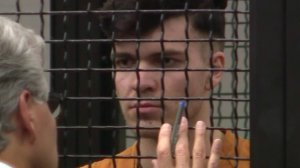Expletive-ridden accounts of harassing homosexual people online were chief among the new pieces of evidence detailed by detectives during a preliminary hearing for Blaze Bernstein’s murder trial on Tuesday.
The man accused of killing Bernstein, Samuel Woodward, allegedly stabbed him to death because he was gay, according to prosecutors. Bernstein, 19, disappeared on Jan. 2. A week later, his body was found in a shallow grave in some shrubbery surrounding a park in Lake Forest.
At Tuesday’s preliminary hearing inside Harbor Justice Center, detectives told the court that a knife with dried blood was found inside 21-year-old Woodward’s bedroom and there were what appeared to be knife wounds on his neck and hands.
The trial will move forward with Woodward’s next court date scheduled for Sept. 17.

But some of the most chilling evidence was Woodward’s alleged online entries that appeared to express hatred towards the LGBTQ community. Last month, the Orange County District Attorney’s Office filed a hate crime sentencing enhancement in the trial.
On Jan. 12, Woodward was arrested on suspicion of killing the University of Pennsylvania student after they met up while Bernstein was home for winter break. At the time, Woodward was known to authorities as someone he knew from high school.
But details later emerged showing a darker picture of Woodward, according to investigators. On Tuesday, detectives presented evidence including online posts and diary entries detailing what appears to be Woodward harassing gay people online.
“They’re f—ing terrified LMAO,” one entry said, as it was read in court by an Orange County detective.
“One even said he was going to report me to the FBI. Go ahead and try pal, this is too much fun,” the entry continued. “They think they’re going to get hate crimed and it scares the s–t out of them. F—ing priceless.”
There were also Nazi images and other images for Atomwaffen, a neo-Nazi extremist group he’s accused of being part of, according to investigators. One of those images was used as his screen saver, authorities noted.
In his online diaries, he discussed how he would “troll” gay men — acting as if he’s interested in them only to turn on them later, authorities said.
The images found on Woodward’s laptop, cell phone and social media posts were described as “graphic and chilling” by O.C. District Attorney Tony Rackauckas when prosecutors first announced the hate crime sentencing enhancement in early August.

Just weeks after the killing, ProPublica published an investigation into Woodward’s past that revealed him to allegedly be involved in the extremist group Atomwaffen, which espouses anti-semitic and homophobic views.
The sentencing enhancement was filed months after Woodward was charged with murder, as prosecutors worked to build a hate crime case.
But in the days after Woodward’s arrest, Bernstein’s parents had already heard details from law enforcement officials that indicated their son may have been targeted because he was gay, according to the Los Angeles Times.
“Our son was a beautiful gentle soul who we loved more than anything,” Gideon and Pepper Bernstein wrote in a statement at the time. “We were proud of everything he did and who he was. He had nothing to hide. We are in solidarity with our son and the LGBTQ community.”
“If it is determined that this was a hate crime, we will cry not only for our son, but for LGBTQ people everywhere that live in fear or who have been victims of [a] hate crime,” they wrote.





















